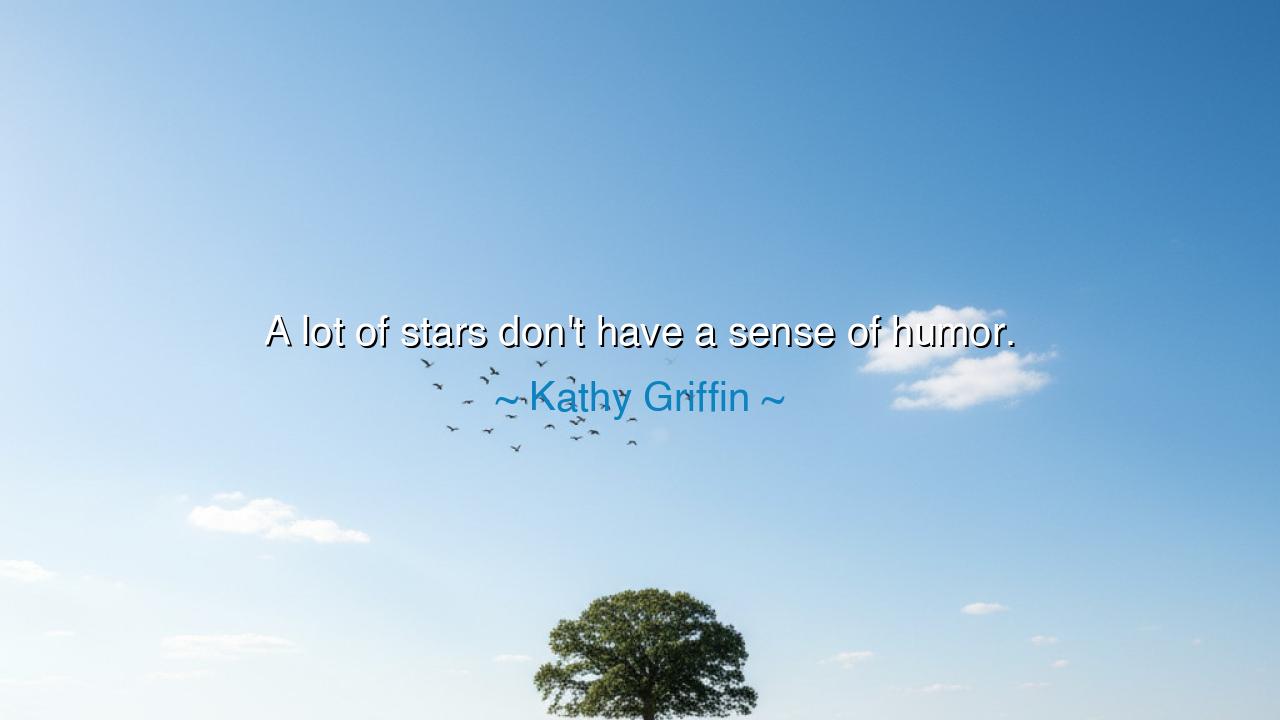
A lot of stars don't have a sense of humor.






The words of Kathy Griffin—“A lot of stars don’t have a sense of humor”—carry more than wit or complaint; they carry the lament of one who has looked behind the glittering curtain of fame and found pride where there should have been humility, vanity where there should have been laughter. In her simple statement lies a profound reflection on human nature, on the fragility of ego, and on the sacred power of humor to keep the soul grounded amidst adoration. Griffin, a comedian whose art is forged from both satire and self-deprecation, speaks as a truth-teller among idols. Her words remind us that those who rise too high often forget to laugh—not because the world no longer offers joy, but because they have become too enamored of their own reflection to see it.
To possess fame is to stand in dangerous light. The gaze of others, ever fixed upon you, can harden the spirit. The “stars” Griffin speaks of are not merely celebrities, but symbols of all who forget their humanity when exalted by success. Their loss of humor is not accidental—it is the slow withering of perspective. For humor is born from humility; it is the ability to laugh at oneself, to see one’s flaws and absurdities as part of the great comedy of life. When one cannot laugh at oneself, one becomes brittle—trapped within the armor of pride. The star without humor shines bright, but her light is cold.
In the ancient world, the philosophers knew this truth well. The sage Socrates, whom men called the wisest of the Athenians, was often mocked and ridiculed—yet he never ceased to smile. When accused of ignorance, he replied, “I know only that I know nothing,” and his laughter turned accusation into wisdom. Socrates had what many “stars” lack: the power to laugh at his own limits. He understood that humor is a shield against vanity, a reminder that even the greatest minds remain small before the vastness of truth. To lose humor, therefore, is to lose balance—to fall from wisdom into arrogance, from light into shadow.
The story of Charlie Chaplin offers another sacred lesson. Though he was perhaps the most famous man on earth, adored by millions, Chaplin never ceased to mock his own image. In The Great Dictator, he dressed as a tyrant and lampooned the very idea of power. He made the world laugh not by elevating himself, but by exposing the folly of those who could not laugh. Through his art, he revealed the divine paradox Griffin points to: that humility gives birth to humor, and humor in turn protects humility. The one who laughs is safe from self-worship; the one who cannot laugh is already enslaved by it.
Griffin’s quote is thus both sharp and sorrowful. It is not merely a jest about entertainers—it is a reflection on the disease of importance that can afflict any human being. When a person begins to believe that they must always appear perfect, noble, or untouchable, they close their heart to laughter. They become fearful of appearing foolish, and in doing so, lose the freedom that laughter brings. The sense of humor is not frivolous; it is spiritual resilience. It is the ability to face the absurdity of life without despair, to find light even in imperfection. Without it, even the brightest star will eventually burn itself out in solemn isolation.
The origin of Griffin’s wisdom comes from her world of comedy—a world where truth is spoken in jest, and laughter exposes what pride conceals. As a comedian, she has stood before audiences and mocked the powerful, knowing that to laugh is to reclaim equality. Her words come from witnessing those who have everything and yet lack joy, those who bask in applause but cannot smile sincerely. The humorless star is a tragic figure: adored by the masses but alienated from the simplest pleasures of existence.
Let this truth be passed down as counsel to all generations: Never lose your sense of humor, for it is the guardian of your soul. When life exalts you, laugh at your own success. When it humbles you, laugh still—gently, knowingly, with gratitude. Remember that laughter does not diminish greatness; it sanctifies it. For the mighty who can laugh at themselves remain human, while those who cannot soon forget what it means to be alive.
So heed the wisdom hidden in Kathy Griffin’s jest: Do not become a star without laughter. Shine, but never so brightly that you cannot see your own shadow. For the universe itself, vast and divine, is filled with irony—the stars burn, yet they too fade; the gods watch, yet they too are forgotten. Only those who carry humor in their hearts endure, for they walk lightly through both triumph and failure, smiling as they go, knowing that the truest strength of all is the ability to laugh.






AAdministratorAdministrator
Welcome, honored guests. Please leave a comment, we will respond soon